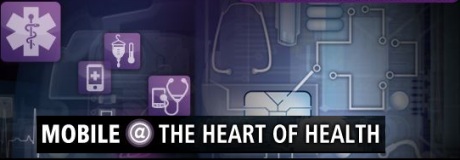A sneak peek at this week's Mobile Health Summit

On Friday, June 3, I attended an advance meeting for the Mobile Health Summit taking place from June 6-9, in Cape Town, South Africa. The United Nations Foundation held this briefing to discuss "how mobile technology is delivering dramatic results in the health field".
There was a panel of experts on the teleconference, and they presented ways mobile health (which they referred to as mHealth) is changing the way health services are being delivered. They also talked about some of the challenges and early lessons learned from projects in emerging markets.
The players
The experts represented a variety of organizations. Each one spoke for about five minutes about their area of interest and expertise, and talked a bit about what their organizations are doing in the area of mHealth.
Jody Ranck
The moderator was Jody Ranck, Director of thought leadership, policy and advocacy for the mHealth Alliance.
Jody introduced the speakers. He said a bit about the conference's purpose in response to the critical issues faced by healthcare systems worldwide, including aging populations and chronic and infectious diseases. Mobile innovation in telecom has grown rapidly over the past few years, and innovations are being built upon this growth to provide more cost effective and higher quality care.
According to the press release from the mHealth Alliance:
The mHealth Alliance (mHA) mobilizes innovation to deliver quality health at the furthest reaches of wireless networks and mobile devices. Working with diverse partners, the mHA advances mHealth through research, advocacy, and support for the development of interoperable solutions and sustainable deployment models.
The mHA sponsors innovation challenges and conferences, leads cross-sector mHealth initiatives, and hosts HUB (Health UnBound), a global online community for resource sharing and collaborative solution generation.
Hosted by the United Nations Foundation, and founded by the UN, Rockefeller, and Vodafone Foundations, the mHA now also includes PEPFAR, HP, and the GSM Association among its founding partners.
Visit the website for the MHealth Alliance.
Adele Waugaman
The first speaker was Adele Waugaman, Senior Director Technology Partnership, UN Foundation.
Adele spoke about how the UN Foundation and Vodaphone partnership (which began in 2005), in conjunction with the World Health Organization, will be releasing the results of the first comprehensive global survey about how governments and NGOs (non-governmental organizations) around the world are using mobile tools to support health goals.
This benchmark has analyzed 112 countries in 13 categories to provide a comprehensive picture of what mHealth use looks like globally, what key areas that are lagging behind, and what tools are being used.
Demonstrations will be featured and demonstrated by users at the mHealth summit.
According to their website:
The United Nations Foundation links the UN’s work with others around the world, mobilizing the energy and expertise of business and non-governmental organizations to help the UN tackle issues including climate change, children’s health, peace and security, and poverty eradication.
Visit the website for the UN Foundation.
Gavin Krugel
Next up was Gavin Krugel, Head of Health at GSMA (Global System for Mobile Association). If you think that sounds familiar, you'd be right. If you have an AT&T iPhone, it runs on GSM, as do many other brands of phones.
Gavin spoke of how the GSMA mobile health program and its summit were meant to provide the industry with a platform to convene and share research and movement within the new adjacent market for mobile operators. It's part of their mission, which includes "reducing the cost to serve while extending the reach and the quality of healthcare by putting mobile at the heart of health".
He mentioned that GSMA has a three-year strategic research and advocacy program. Through that, they plan to provide analysis of the role and opportunity for mobile within health systems, which will help create sustainable solutions.
According to their website:
The GSMA represents the interests of mobile operators worldwide. Spanning 219 countries, the GSMA unites nearly 800 of the world’s mobile operators, as well as more than 200 companies in the broader mobile ecosystem, including handset makers, software companies, equipment providers, Internet companies, and media and entertainment organisations. The GSMA also produces industry-leading events such as the Mobile World Congress and Mobile Asia Congress.
Visit the website for the GSMA.
Carlos Martínez Miguel
The next speaker was Carlos Martínez Miguel, Head of Strategic Analysis & Planning, Global Healthcare for Telefonica.
Carlos talked about how Telefonica was created to address the high potential they foresee in the healthcare sector. He spoke of the crossroads we're currently approaching because of global trends, the quality and accessibility of service (especially for high risk and aging populations), the prevalence of chronic diseases, and the shortage of healthcare professionals.
Carlos focused on how communications can help to connect the healthcare system with individual patients at home and on the move. Telefonica wants to foster integration and collaboration between professionals, empowering them to get access to solutions which will improve quality of life, peace of mind, higher safety, and better lives for patients.
According to their website:
Telefónica is one of the world leaders integrated operator in the telecommunication sector, providing communication, information and entertainment solutions, with presence in Europe, Africa and Latin America. It operates in 25 countries. As of March 2011, Telefónica’s total number of customers amounted to 290.5 millions.
Visit the website for Telefonica.
Sandhya Rao
Next, we heard a presentation from Sandhya Rao, Senior Advisor for Private Sector Partnerships at USAID (United States Agency for International Development). She works on public/private partnerships in the bureau for public health.
Sandhya spoke about the US Global Health Initiative, and how it provides a framework for partnerships in mHealth in order to achieve significant global health improvement. Through the GHI, the Obama administration is committed to improving and saving lives by strengthening heath systems. One of the ways they do this is using mobile technology.
One of the exciting partner programs Sandhya spoke about was recently announced by Secretary of State Hillary Clinton. USAID has partnered with J&J, the mHealth Alliance, and the UN Foundation to implement the MAMA (Mobile Alliance for Maternal Action) program over the next three years.
MAMA will help pregnant women with prenatal care, and once their children are born, with early childhood health. This will all take place through the use of the mom's mobile phones. For more information on this partnership visit www.mobilemamaalliance.org.
USAID is the United States government agency providing U.S. economic and humanitarian assistance worldwide for more than 40 years.
Visit the website for USAID.
This week's Mobile Health Summit in Cape Town, South Africa sounds like a fascinating and promising event for the mHealth industry. I sure wish I could attend!
Check out the the Mobile Health Summit website for more information about the event.
